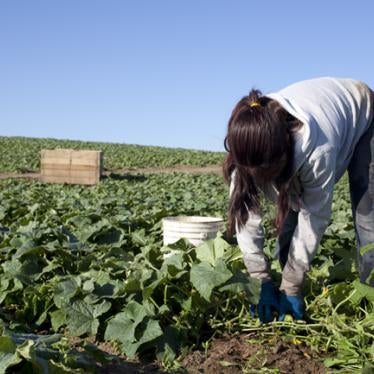(New York) – A prominent tobacco growers’ organization announced a new child labor policy that could help protect children from dangerous work on tobacco farms in the United States.
The Tobacco Growers Association of North Carolina, which represents more than 2,300 tobacco farmers in North Carolina and neighboring states, issued a policy on October 1, 2014 stating that it “does not condone the use of child labor.” The policy says that children under 16 should not be hired to work on tobacco farms, even with parental permission.
“The Tobacco Growers Association of North Carolina has taken an important step toward ending hazardous child labor on US tobacco farms,” said Jo Becker, children’s rights advocacy director at Human Rights Watch. “By implementing this policy, growers will protect child workers from real danger.”
In May, a Human Rights Watch report documented hazardous child labor on tobacco farms in North Carolina, as well as in Kentucky, Tennessee, and Virginia – four states that account for 90 percent of tobacco grown in the US. Children reported vomiting, nausea, headaches, and dizziness while working on tobacco farms, all symptoms consistent with acute nicotine poisoning. Many also said they worked long hours without overtime pay, often in extreme heat without shade or sufficient breaks, and wore no, or inadequate, protective gear.
Under US labor law, children as young as 12 can be hired for unlimited hours outside of school hours on a farm of any size with parental permission, and there is no minimum age for children to work on small farms. At 16, child farmworkers can do jobs deemed hazardous by the US Department of Labor. Children in all other sectors must be 18 to do hazardous work.
Existing US law and regulations do not limit work by children in tobacco farming, despite the hazardous nature of the crop.
The new policy from the Tobacco Growers Association of North Carolina explicitly opposes hiring children under 16 to work in tobacco farming, and recommends that employers “be cautious about employing 16 and 17-year-old workers in tobacco” to ensure that they perform only non-hazardous tasks.
The Association should expand its new policy to cover all children under 18, Human Rights Watch said, noting that children are particularly vulnerable to toxic exposure, and that protective equipment is not sufficient to protect children from the hazards of the work. International labor law prohibits hazardous work by children under age 18.
Human Rights Watch has urged 10 of the world’s largest tobacco companies to prohibit children under 18 from doing hazardous work on farms in their global supply chains, including any work that involves direct contact with tobacco in any form.
Both global tobacco companies and business associations – such as growers’ groups – have responsibilities to respect and protect the human rights of workers in the supply chain under the United Nations Guiding Principles on Business and Human Rights, including the elimination of child labor, Human Rights Watch said.
Human Rights Watch and more than 50 other nongovernmental organizations have also urged the Obama administration to take regulatory action to ban children from hazardous work on tobacco farms. A spokesperson for Philip Morris International, one of the world’s largest tobacco companies, was quoted in a September 6 New York Times article as saying the company “would welcome a strengthening of the US regulatory framework.” On September 20, 35 members of the US House of Representatives sent a letter to US Labor Secretary Thomas Perez, urging the Labor Department to issue a rule to prohibit children from hazardous work in tobacco farming.
In early September, another leading tobacco industry group, the Council for Burley Tobacco, announced it opposed the hiring of children under 16 to work in tobacco farming anywhere in the world.
“Industry groups are acknowledging the risks to children of working on tobacco farms, and are adopting policies to help protect child workers from danger,” Becker said. “Now the Obama administration needs to act and address the gaps in US law and regulations that put child tobacco workers at risk.”







